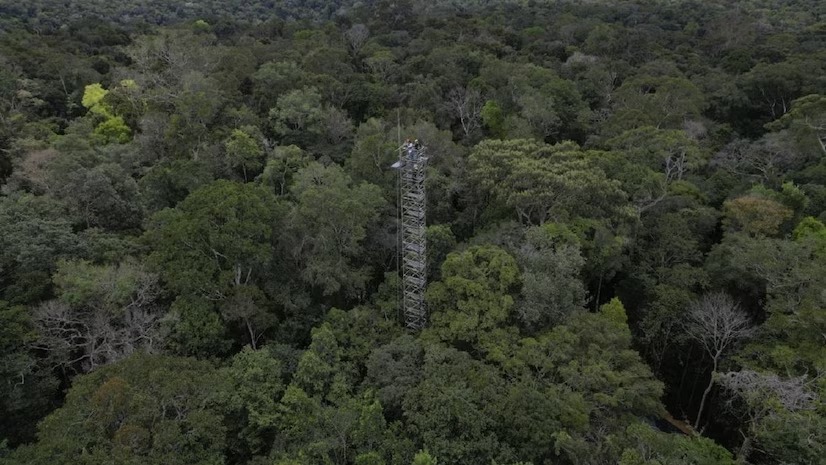The Amazon Summit in Brazil concluded on Wednesday with a roadmap to safeguard tropical rainforests, which was hailed as a major step towards combating climate change but fell short of the explicit commitments demanded by some environmentalists to prevent deforestation.
Leaders and ministers from eight Amazon nations signed a declaration Tuesday in Belem, Brazil, outlining goals to stimulate economic development in their respective countries while preventing the Amazon’s continuous decline from reaching a tipping point.
Several environmental organisations regarded the proclamation as a collection of good ideas with few measurable goals and timelines. Others, though, praised it, and the Amazon’s umbrella organisation of Indigenous organisations applauded the inclusion of two of its primary objectives.
It is essential that the region’s authorities have listened to science and recognised society’s call: the Amazon is in danger, and we don’t have much time to act, said the worldwide group WWF in a statement. However, WWF laments that the eight Amazonian countries have not established an agreement to cease deforestation in the region as a group.”
The presidents of the Republic of Congo and the Democratic Republic of the Congo, an emissary from Indonesia’s president, and France’s ambassador to Brazil, representing the Amazonian province of French Guiana, attended the conference on Wednesday. Norway, the largest contributor to Brazil’s Amazon Fund for Sustainable Development, also sent an emissary.
On Wednesday, national delegates signed a similar, but much smaller, agreement to that signed the day before by their counterparts; it, too, featured no precise goals and primarily reinforced criticism of rich nations for failing to pay promised enormous climate money.
Bolivia, Brazil, Colombia, Ecuador, Guyana, Peru, Suriname, and Venezuela are members of the newly resurrected Amazon Cooperation Treaty Organisation, or ACTO, and hope that a united front will give them a major voice in global environment talks ahead of the COP 28 climate conference in November.
The conference strengthens Brazilian President Luiz Inacio Lula da Silva’s policy of leveraging worldwide attention for the preservation of the Amazon. He has sought foreign financial backing for forest protection, buoyed by a 42% decrease in deforestation during his first seven months in office.
Lula, speaking to reporters following the conference, railed against protectionist tactics disguised as environmental concerns that restrict imports from developing countries, and said wealthy countries must follow through on their vows to provide financial support for forest protection.
Nature, which has been contaminated for 200 years by industrial progress, requires people to pay their fair share so that we can restore some of what has been ruined. Nature is in desperate need of funds.
The Amazon covers an area twice the size of India. Brazil owns two-thirds of it, with the remaining third shared by seven other countries including the territory of French Guiana. Governments have long considered it as a territory to be colonised and exploited, with little concern for sustainability or Indigenous peoples’ rights.
The Amazon countries have all accepted the Paris climate agreement, which mandates parties to set reduction targets for greenhouse gas emissions. However, cross-border cooperation has historically been limited, hampered by a lack of confidence, ideological disagreements, and a lack of government presence.
ACTO members, meeting for the fourth time in the organization’s 45-year history, indicated Tuesday that they are not totally agreed on crucial topics.
Commitments to forest protection have been patchy. And, contrary to popular belief, their joint proclamation did not include a mutual commitment to zero deforestation by 2030. Brazil and Colombia have already committed to this.
According to some scientists, destroying 20% to 25% of the forest may result in huge decreases in rainfall, converting more than half of the rainforest to tropical savannah and resulting in massive biodiversity loss.
The Climate Observatory, a network of dozens of environmental and social groups, as well as Greenpeace and The Nature Conservancy, expressed disappointment with the declaration’s absence of specific pledges.
The declaration’s 113 operating paragraphs have the merit of resurrecting the long-forgotten ACTO and acknowledging that the biome is approaching a point of no return, but it lacks actual remedies or a schedule of activities to avoid disaster, according to the Climate Observatory.
Colombian Indigenous leader Fany Kuiru of the Coordinating Body of Indigenous Organisations of the Amazon Basin praised the declaration for meeting two of their primary demands: recognition of their rights to traditional territories and the establishment of a mechanism for Indigenous peoples’ formal participation within ACTO.
Bruna Santos, director of the Woodrow Wilson Center’s Brazil Institute, said the summit exhibited an effort to address the Amazon as a regional topic, but it also exposed inconsistencies in Brazil’s government’s goals, including oil exploitation.
Colombia’s president slammed the absurdity of promoting Amazon preservation while pursuing oil, comparing it to “betting on death and destroying life.”
Despite conflicts, there was evidence of improved regional collaboration and a rising worldwide acknowledgment of the Amazon’s importance in mitigating climate change. A common voice, as well as greater funding for ACTO, might enable it serve as the region’s representation on the global arena ahead of the COP climate meeting, according to officials.
Lula has avoided adopting a firm stance on oil, portraying the decision as a technical one. Meanwhile, Brazil’s state-owned Petrobras has been looking for oil near the Amazon River’s mouth.
Rainforest Foundation Norway’s head of international lobbying, Anders Haug Larsen, believes that the Amazonian states are correct to seek more money from wealthy countries, and that their political commitment to defend the rainforest provides a historic opportunity.
This is where the international community should spend its climate money, he said, with the summit’s strategy and continual reduced deforestation.





